
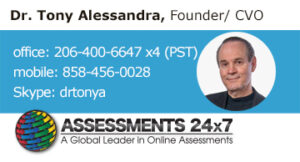



by Judith Glaser

When Bayer, a $7 billion multinational pharmaceutical company, acquired a smaller $300 million diagnostic company, Rolf Classon the CEO, chose to call it a “merger.”
Power-with Others
He wanted to immediately establish a “power-with others” relationship with the new organization. I was part of a consulting team who facilitated a multi-day vision, values, and leadership session to help the leadership team create the new direction for the culture and the business.
“We are becoming one company,” Rolf told the top hundred people from both companies at their kickoff meeting. He went on to convey that he wanted to set new ground rules for working collaboratively in a new environment in which “together we can create something that never existed before.”
The executives discussed changes that needed to be made in the organization to maximize the new partnership. Then they broke into smaller teams to craft the new vision and values, with the intent of reporting their insights to the larger executive team.
When the executives reconvened, a spirit of trust and collaboration had clearly emerged. They had worked together to create a vision of shared success and in doing so released a new sense of hope for the future.
Rolf once again stood before the group and asked, “How many of you have been through a visioning session before?” Everyone raised his or her hand.
“How many of you have left those sessions and returned to the workplace, only to find that nothing had changed?” Mostly everyone raised his or hand. He then declared, “For us to be successful as an organization, we need to realize that we can’t create the organization we want without making fundamental changes in ourselves.”
Candor Opens a New Door to the Future
As the event unfolded, something magical occurred. Rolf, by his example, taught the executives the true meaning of leadership. “Change begins inside each person. So I want to let you know that over the past few days I have been looking at what I’ve been doing to unknowingly prevent change from taking place.
“I’ve discovered at least sixteen things I want to change about myself! Here are my top three: my arrogance, my control, and my lack of trust.
“At lunch I want you each to think about what change means to you, and what you can do personally to inspire your own growth. After lunch I want to hear from my top executives — from the podium — expressing their personal insights.”
The CEO allowed himself to be as transparent and vulnerable as he had ever been in his life when he acknowledged the personal work he needed to do to make this merger a success. As he left behind his flaws so did the other executives, which made room for cooperation and partnership to grow.
Rolf continued his talk about the future. He engaged others in conversations about the “big challenges” and the “big picture.” The key was creating a shared context for change. By setting the stage in this way, he enabled others to find a common ground on which to build the future. The Bayer merger became the most successful in the company’s history.
Candor Unlocks Culture Change and Transformation in Organizations
Through our research and client projects over the past decade, we have identified that candor is the behavior that best predicts high performing teams and the single most important success factor in transformation and change. Organizations that exhibit high levels of candor produce the highest and most successful performing teams.
Here are 5 ways to elevate every day – and experience a release in the capacity to create and sustain change, growth and transformation:
By setting the context for candor throughout all of your leadership interactions, you level the playing field. You set the tone for people to be candid with each other – and candor leader to trust. I trust you have my back – I trust your intentions – I trust you care. Power and hierarchy become less important than the results colleagues can create together through trust, honesty and teamwork.
Neuro-tip: Candor, truth and trust
While the words – candor, trust and trust – are different, the meaning of these words activate the same networks in our brain. When we display the Prefrontal Cortex, our Executive Brain. This network opens the power of the Executive functions, such as strategic thinking, empathy, foresight, intuition, good judgment and handling uncertainty with less fear. So candor plays a role in elevating our capacity to work through difficult challenges with others – a core activity for change and transformation in organizations.
Candor is a door to tapping wisdom and for discovering new ways to handle the challenges we face when stakes are high and uncertainty abounds. As Rolf Classon discovered – by setting the stage for candor with his top 200 executives – he created a comfort zone for others in his team to lead with candor – elevating trust and the organizational potential for higher levels of personal, team and organizational success during the biggest transformation Bayer ever embarked upon.
CANDOR AND TRUST Are the Fabric of a Healthy Culture
Here are 5 things you can do, as a Leader of Change, to elevate candor and TRUST as the foundation for healthy conversations in your organization.
Success Factor #1: Elevate Candor and elevate Transparency and Trust
Our brain is highly sensitive to reading signals of friend or foe as we interact. In .07 seconds we can tell if someone is telling us the truth and when they do we label them friend and our whole mindset reconfigures to allow us to engage more deeply. Being candid sends signal we will be open transparent in our conversations, and therefore we can trust each other to had our back. These decisions are built into our hardwiring and take place in Nano-seconds and elevate the quality of our conversations.
Success Factor #2: Elevate Candor and Deepen Relationships
When we learn how to be candid with others, we engage at a deeper level of connectivity. Our brain radiates energy, and the energy of connection is more powerful than any other, yet we can’t access this unless we feel safe. Being candid and focusing our candor on enhancing our relationship – such as telling the truth about who we are, or helping build relationships before focusing on task – shows we value others and want to build on each others strengthens. These decisions take place in Nano-seconds and elevate the quality of our conversations and our relationships.
Success Factor #3: Elevate Candor and Deepen Understanding
When we learn how to be candid, we are able to step into each other’s world, and understand each other’s perspectives rather than feeling we need to defend our own. The need to be right is and addiction which gets stronger when we are uncertain of where we stand. When we learn to deepen our connectivity by focusing on understanding others intentions, dreams, and aspirations – we communicate we have their best interest at heart. Our Prefrontal Cortex and Heart connection actually strengthen physiologically – and the quality of our conversations escalates – magnifying our ability to achieve greater results with others.
Success Factor #4: Elevate Candor and Build Shared Success
When we learn how to be candid, we are able to spend more time exploring what success looks like with others – not just my success – our shared success. Rather than focusing on ‘my needs’ – I am able to build a new world view that combines yours and mine in ways we would never have thought about it before. We know that our Executive Brain – our Prefrontal Cortex – has the capacity to literally build holograms of the future – when we are open enough to access this human capacity – we join our best thinking into one new world view with Shared Success as the outcome.
Success Factor #5: Elevate Candor and Elevate Courage to tell the truth
When we learn how to be candid, we elevate our courage to step up, and speak out. Human beings need to share what is on their mind. When we mask the truth, or avoid the truth, or when we avoid difficult conversations our body chemistry shifts. The word disease is ‘dis-ease’ and it’s a chemical discomfort that blocks the vital instincts for growth. Finding ways to be candid and caring at the same creates the healthy space for truth telling while strengthening relationships with others.
Candor is One Act that Changes Everything
Learning to have healthy conversations is the most fundamental and vital skills of a transformational leader. As Rolf Classon learned when he stepped up and stepped out of his own fear, and stepped forward to connect with his team through candor. Make candor a priority and open the door to business success. On some levels, we human beings are very simple. We turn to those who make us feel good and we turn away from those who make us feel bad. Finding comfort from people who care about us is a healthy strategy. Learning to down-regulate fear at work and up-regulate the factors that stimulate growth is a winning strategy for success is a game changer.
Judith E. Glaser is the CEO of Benchmark Communications, Inc. and the Chairman of The Creating WE Institute. She is the author of the best selling book, “Conversational Intelligence” (Bibliomotion, 2013), an Organizational Anthropologist and a consultant to Fortune 500 companies.Visit her at creatingwe.com; conversationalintelligence.com or contact her at jeglaser@creatingwe.com. Follow Judith on Twitter @CreatingWE or connect with her on Facebook.
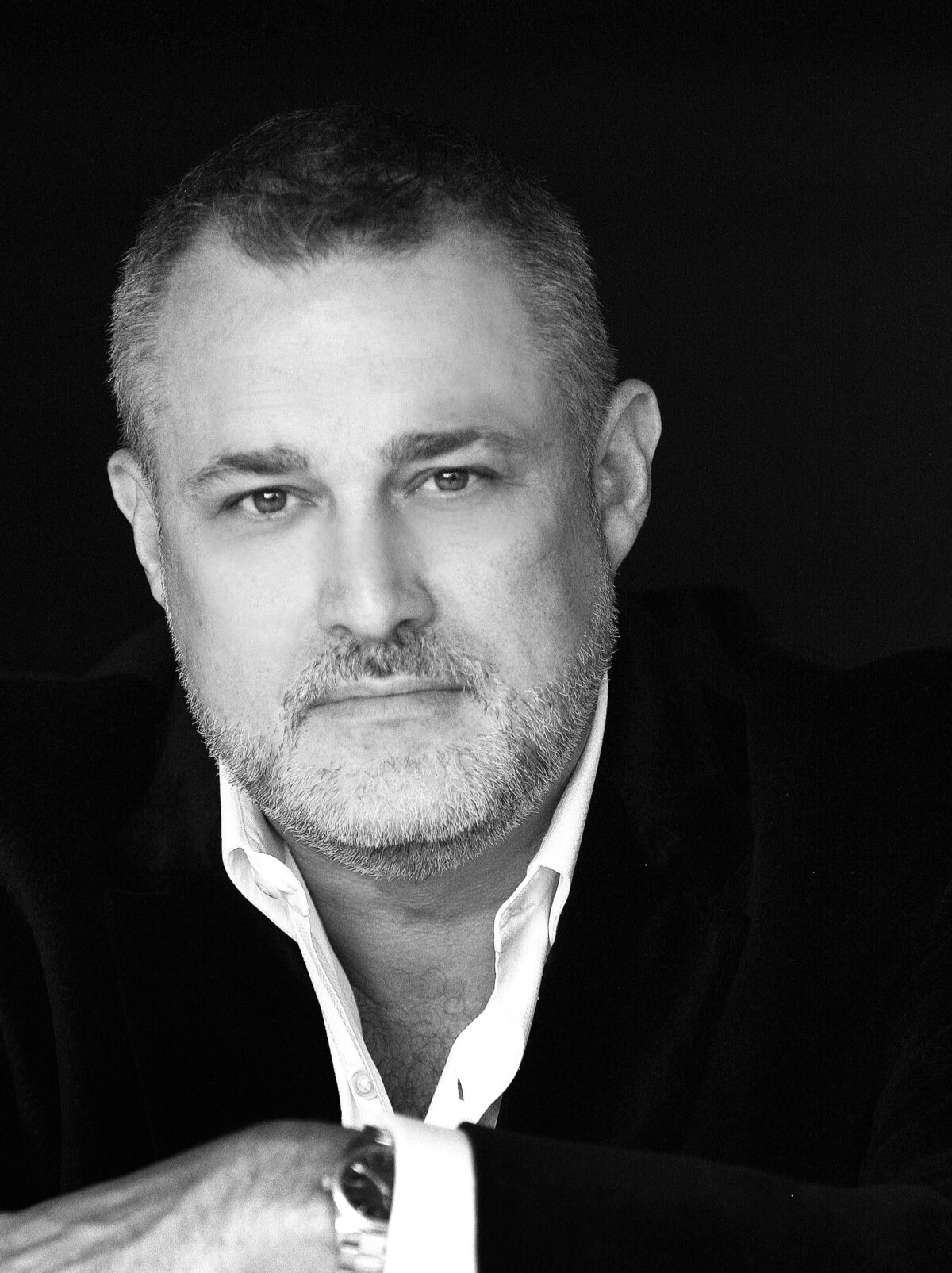

There’s an old saying in the sales business that I firmly believe in, “Go where your customers are.” Nowadays, your customers are frequenting one place in particular above anywhere else, and that place is social media. Never before has it been easier for customers to get in touch with a business—and actually get a reply back—but thanks to social media platforms like Twitter and Facebook, a simple comment to a company can elicit a response in a matter of seconds. Which is great for customers, but for salespeople, who already have a million tasks on their plates on any given day, sometimes it can feel nearly impossible to carve time out of their busy schedules to communicate with customers via social media. If you’re not working for a large corporation with its own internal social media department, oftentimes either you or someone else on your team is stuck with the task of managing social media accounts. But before you complain, hear me out. Social media is a great resource for increasing your sales leads. And the best part is that there are dozens of social media listening tools out there that make it easy to stay on top of your accounts. However, before I get into how social media can increase sales leads, let me first mention a couple social media listening tools that I use daily that I think could be beneficial to you, too.
At one time, this was one of the only social media listening tool available, and even today, it’s by far one of the easiest to use. Basically, using Google, you set up a keyword search or alert for any topic that interests you, from specific companies to subjects you enjoy following. Every time something is published online relating to your selections, you’ll receive a message in your Gmail inbox with a link. One alert that I highly recommend is your own name. Sure, it may sound a little bit vain and Kardashian-esque, but in all honesty, it’s far from it. Google Alerts is a great way for me to be notified every time one of my articles or blog posts go live, as well as a good resource for when I’m mentioned in other people’s articles.
2. Hootsuite
It feels like every day there’s a new social media platform launching, it can be time consuming to have to post to each one of them separately, let alone keep track of postings. This is especially the case if you’re managing social media for a company. That’s where Hootsuite comes in. Hootsuite works across 35 social networks and lets you schedule postings for different times of the day, monitor feedback from your posts, and receive in-depth analytics across all of your platforms. If you need to be everywhere at once, this is the listening tool for you.
So now that you know a little bit more about social media listening tools, how can they help increase sales leads? There are a few ways:
• They can help you find new leads. Like I mentioned earlier, never before has it been easier for customers and companies to connect, than now. Sure, back in the day a customer could stroll into your store to make a purchase and you could have a face-to-face conversation, but thanks to technology, this kind of sale seems downright archaic. Rather, customers are relying on the Internet to make purchases via e-commerce sites like Amazon.com, and I’m willing to bet that this mega corporation wooed many a customer away from its competitors by using social media as opposed to traditional advertising methods like newspaper or radio ads.
• They can help fine-tune your pitch. Say you sent out a tweet that had a particularly successful response rate. The reason you know this is because you’ve been tracking your analytics on Hootsuite or a similar tool. Once you have a better understanding of why this tweet garnered so many replies, you can apply a similar strategy to future tweets. For example, in my own experience, I’ve found that tweets structured as questions have proven successful, because they encourage people to reply back with an answer.
• They can help you solve customer’s complaints. Perhaps one of your customers is unsatisfied with your company, or product, and they posted a scathing review on a site like Yelp. Unless you’re scanning Yelp on a daily basis, most likely you may never see this person’s review. But with a social media listening tool like Google Alerts, their complaint will find its way into your inbox and you’ll be quicker to reply to help solve the issue, and hopefully salvage your relationship in the process. As a customer, there’s nothing worse than not having your concerns heard, but by sending a (polite and professional) reply, you’re one step ahead of the game.
• They can help you check out your competitors. While you’re setting up a Google Alert for your company, take a second to make one for your closest competitor, too. This way you can stay on top of any social media campaigns they roll out, and maybe even learn a thing or too that you can apply to your own accounts.
Now, tell me, what are some ways that you’ve used social media listening tools to your advantage as a salesperson?
Jeffrey Hayzlett is a primetime television and radio host of C-Suite with Jeffrey Hayzlett and Executive Perspectives on C-Suite TV and All Business with Jeffrey Hayzlett on CBS on-demand radio network Play.It. Hayzlett is a global business celebrity, speaker, best-selling author, and Chairman of C-Suite Network, home of the world’s most powerful network of C-Suite leaders. Connect with Hayzlett on Twitter, Facebook, LinkedIn, Google+ or www.hayzlett.com.
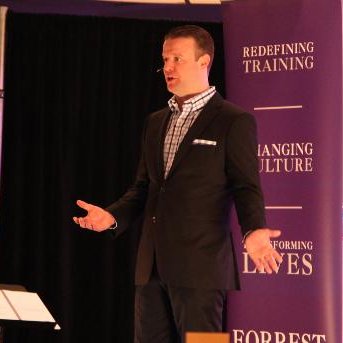
By Jason Forrest, CEO, Head Coach Forrest Performance Group
What could you accomplish if you had unlimited brainpower and several lifetimes’ worth of experience to bring to bear on solving a problem? The truth is—you do have access to such unlimited power. And it’s not some pill you’ve seen in a science fiction movie. It’s in the people you know. An effective mastermind group of peers—high level executives from a variety of industries—can be invaluable to your business.
Merriam-Webster defines mastermind as “a person who supplies the directing or creative intelligence for a project.” Wouldn’t it be amazing to have the chance to interact with and learn from someone who could provide this kind of leadership and know-how in an area that’s not exactly your sweet spot? Multiply that level of amazing by two, three, even eight, and you’ll get a sense of what a truly incredible, game-changing resource a mastermind group can be.
A mastermind group—a concept I first learned about from Think and Grow Rich by Napoleon Hill—is a place to share ideas, learn best practices, and benefit from others’ brains, experience, and belief systems. The book calls such a group “a coordination of knowledge and effort and a spirit of harmony between two or more people for the attainment of definite purpose.”
The benefits of such coordination have been invaluable to me personally. For a number of years, I’ve been part of a nine-person mastermind group of entrepreneurs. Each of the eight others in my group has contributed valuable insight that has helped me overcome challenges, specifically in the realms of HR, marketing, and financing.
Here’s how to start a mastermind group to reap similar benefits for your own business:
You now have the makings of a mutually-beneficial mastermind group. Here are a few experience-tested pointers to keep it going strong:
Assembling a mastermind group and staying in regular contact with its members will put each member in position to thrive—both professionally and personally. This kind of mutually-beneficial group is one of the best ways to take advantage of the “work smarter, not harder” mindset.
About the Author
Jason Forrest | CEO, Head Coach Forrest Performance Group As a sales professional, author, speaker, and sales coach, Jason’s job is to empower professionals and executives to unleash their human performance and master their leadership skills in sales, management, culture and service. Jason grew up under the influence of his father (a business owner and professional salesperson), his mother, (a persuasive speaking professor), and Zig Ziglar (his Sunday school teacher and world-famous salesperson/motivational speaker). Jason learned sales by selling rather than observing. These influences and experiences shaped him into who he is today-a salesperson first, a trainer on a mission, a national speaker, and a coach who pushes sales organizations to become the best version of themselves. Every year, Jason delivers approximately 92 keynotes/seminars and conducts 850 group coaching calls with sales teams, sales managers, and executives. See him in action at www.ForrestPG.com
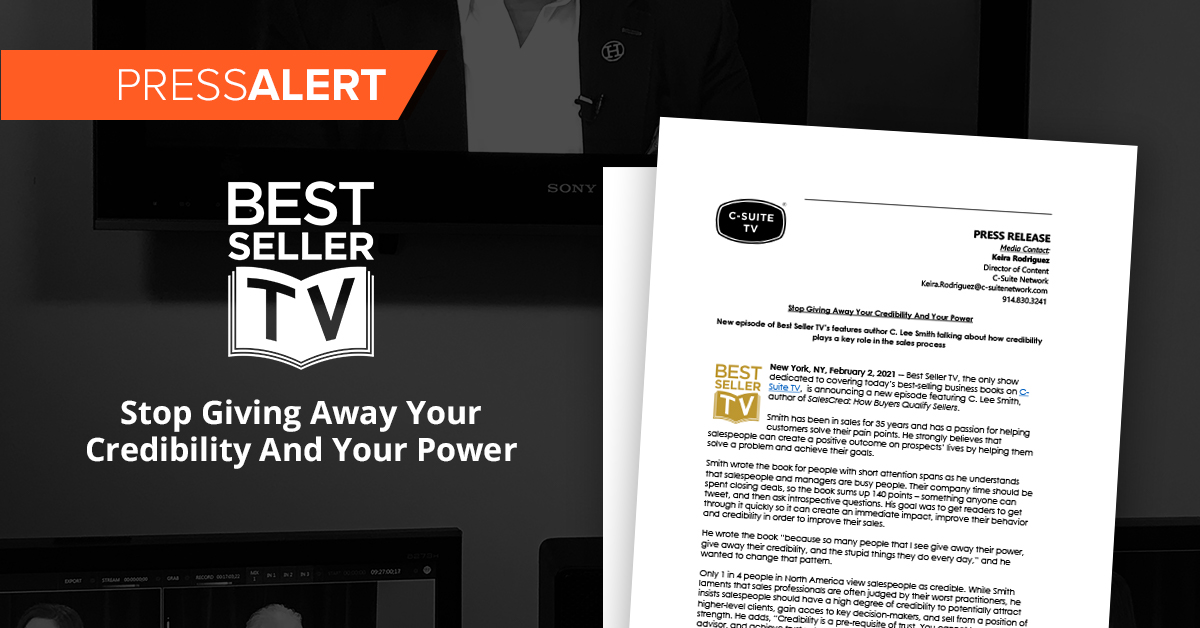
Best Seller TV, the only show dedicated to covering today’s best-selling business books on C-Suite TV, is announcing a new episode featuring C. Lee Smith, author of SalesCred: How Buyers Qualify Sellers.
Smith has been in sales for 35 years and has a passion for helping customers solve their pain points. He strongly believes that salespeople can create a positive outcome on prospects’ lives by helping them solve a problem and achieve their goals.
Smith wrote the book for people with short attention spans as he understands that salespeople and managers are busy people. Their company time should be spent closing deals, so the book sums up 140 points – something anyone can tweet, and then ask introspective questions. His goal was to get readers to get through it quickly so it can create an immediate impact, improve their behavior and credibility in order to improve their sales.
He wrote the book “because so many people that I see give away their power, give away their credibility, and the stupid things they do every day,” and he wanted to change that pattern.
Only 1 in 4 people in North America view salespeople as credible. While Smith laments that sales professionals are often judged by their worst practitioners, he insists salespeople should have a high degree of credibility to potentially attract higher-level clients, gain acces to key decision-makers, and sell from a position of strength. He adds, “Credibility is a pre-requisite of trust. You cannot be a trusted advisor, and achieve trust unless you have credibility.”
However, having credibility doesn’t mean people trust you. These are two separate things that people often put together as one, when they should be separate.
Smith also discussed the most common mistakes salespeople make, such as failing to update their LinkedIn profiles, and offers one key best practice for those looking to increase their credibility, “Act like you’ve been there before.”

All episodes of Best Seller TV air on C-Suite TV and are hosted by TV personality, Taryn Winter Brill.
Best-selling author, speaker, and former Fortune 100 CMO Jeffrey Hayzlett created Best Seller TV to give top-tier business authors a forum for sharing thought-provoking insights, in-depth business analysis, and their compelling personal narratives.
“Trust is a key component in everything you do, including sales. When trust is combined with credibility that is what will make customers want to do business with you,” Hayzlett said. “Lee is a master of the sales process and his knowledge is on full display during this episode.”
For more information on TV episodes, visit www.csuiteold.c-suitenetwork.com/tv and for more information about the authors featured in Best Seller TV episodes, visit www.c-suitebookclub.com.
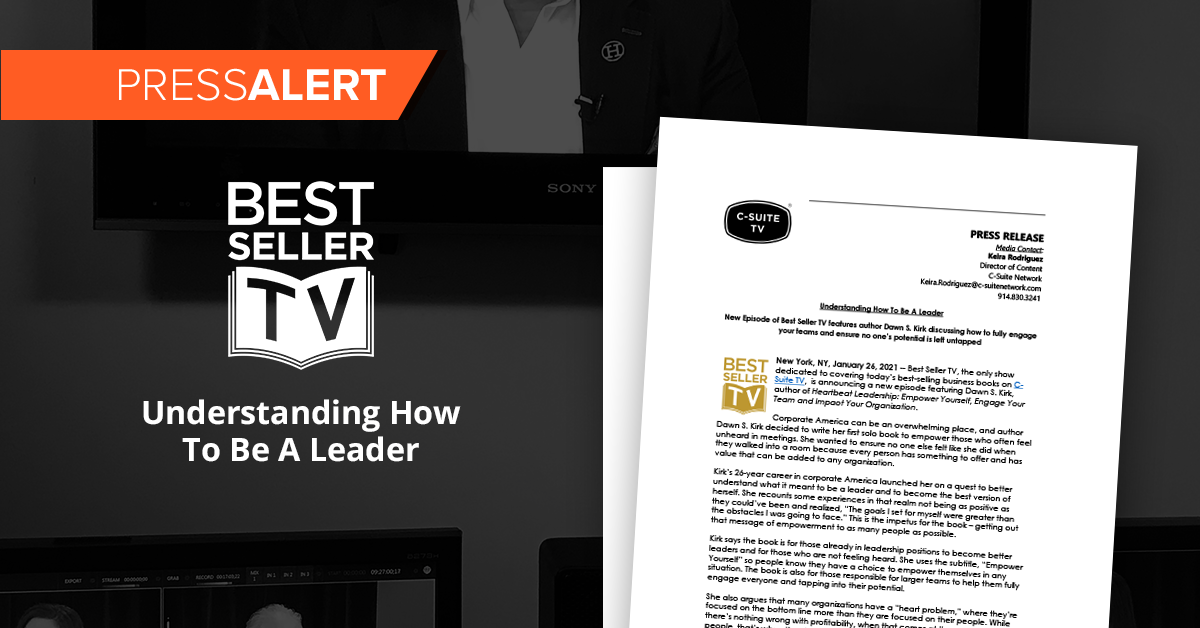
Best Seller TV, the only show dedicated to covering today’s best-selling business books on C-Suite TV, is announcing a new episode featuring Dawn S. Kirk, author of Heartbeat Leadership: Empower Yourself, Engage Your Team and Impact Your Organization.
Corporate America can be an overwhelming place, and author Dawn S. Kirk decided to write her first solo book to empower those who often feel unheard in meetings. She wanted to ensure no one else felt like she did when they walked into a room because every person has something to offer and has value that can be added to any organization.
Kirk’s 26-year career in corporate America launched her on a quest to better understand what it meant to be a leader and to become the best version of herself. She recounts some experiences in that realm not being as positive as they could’ve been and realized, “The goals I set for myself were greater than the obstacles I was going to face.” This is the impetus for the book – getting out that message of empowerment to as many people as possible.
Kirk says the book is for those already in leadership positions to become better leaders and for those who are not feeling heard. She uses the subtitle, “Empower Yourself” so people know they have a choice to empower themselves in any situation. The book is also for those responsible for larger teams to help them fully engage everyone and tapping into their potential.
She also argues that many organizations have a “heart problem,” where they’re focused on the bottom line more than they are focused on their people. While there’s nothing wrong with profitability, when that comes at the expense of the people, that’s when they have a heart problem. Kirk states, “At the end of the day, the heart of the business are the people that work for you. I truly believe people are your competitive advantage.”

All episodes of Best Seller TV air on C-Suite TV and are hosted by TV personality, Taryn Winter Brill.
Best-selling author, speaker, and former Fortune 100 CMO Jeffrey Hayzlett created Best Seller TV to give top-tier business authors a forum for sharing thought-provoking insights, in-depth business analysis, and their compelling personal narratives.
“People are the cog that keeps your business running. There’s nothing wrong with profits, but they shouldn’t come at the expense of your people,” Hayzlett said. “This episode highlights that principle of leadership and addresses what every leader should do – engage their teams, listen to everyone’s ideas and ensure everyone feels heard and that their ideas will have a direct impact on the overall business goals.”
For more information on TV episodes, visit www.csuiteold.c-suitenetwork.com/tv and for more information about the authors featured in Best Seller TV episodes, visit www.c-suitebookclub.com.
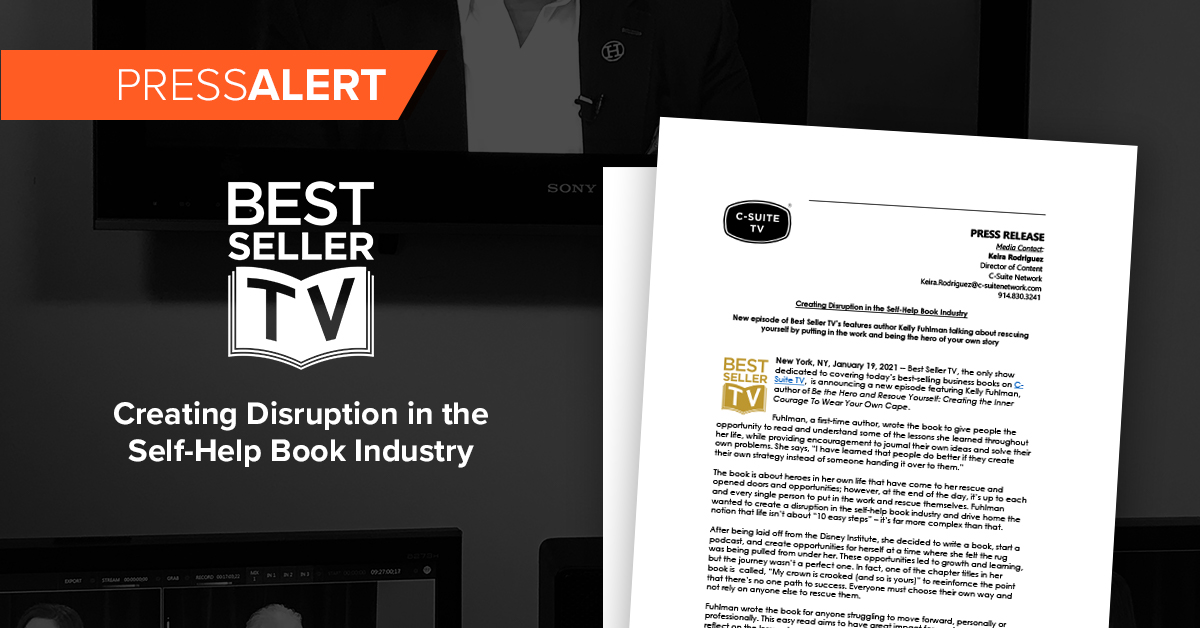
Best Seller TV, the only show dedicated to covering today’s best-selling business books on C-Suite TV, is announcing a new episode featuring Kelly Fuhlman, author of Be the Hero and Rescue Yourself: Creating the Inner Courage To Wear Your Own Cape.
Fuhlman, a first-time author, wrote the book to give people the opportunity to read and understand some of the lessons she learned throughout her life, while providing encouragement to journal their own ideas and solve their own problems. She says, “I have learned that people do better if they create their own strategy instead of someone handing it over to them.”
The book is about heroes in her own life that have come to her rescue and opened doors and opportunities; however, at the end of the day, it’s up to each and every single person to put in the work and rescue themselves. Fuhlman wanted to create a disruption in the self-help book industry and drive home the notion that life isn’t about “10 easy steps” – it’s far more complex than that.
After being laid off from the Disney Institute, she decided to write a book, start a podcast, and create opportunities for herself at a time where she felt the rug was being pulled from under her. These opportunities led to growth and learning, but the journey wasn’t a perfect one. In fact, one of the chapter titles in her book is called, “My crown is crooked (and so is yours)” to reinforce the point that there’s no one path to success. Everyone must choose their own way and not rely on anyone else to rescue them.
Fuhlman wrote the book for anyone struggling to move forward, personally or professionally. This easy read aims to have great impact for readers as they reflect on the lessons learned and empowers them to write down their own thoughts, build their own plan, and move forward.
“At the end of the day, it’s up to you,” she concludes.

All episodes of Best Seller TV air on C-Suite TV and are hosted by TV personality, Taryn Winter Brill.
Best-selling author, speaker, and former Fortune 100 CMO Jeffrey Hayzlett created Best Seller TV to give top-tier business authors a forum for sharing thought-provoking insights, in-depth business analysis, and their compelling personal narratives.
“Opportunities are available to everyone who wants them. Even during crisis, there are opportunities to be had. This episode provides a simple, yet meaningful message for anyone looking to move forward,” Hayzlett said. “After the year we had, we all want to move forward, but it’s simple – it all starts and begins with you. You are the hero of your own story.”
For more information on TV episodes, visit www.csuiteold.c-suitenetwork.com/tv and for more information about the authors featured in Best Seller TV episodes, visit www.c-suitebookclub.com.
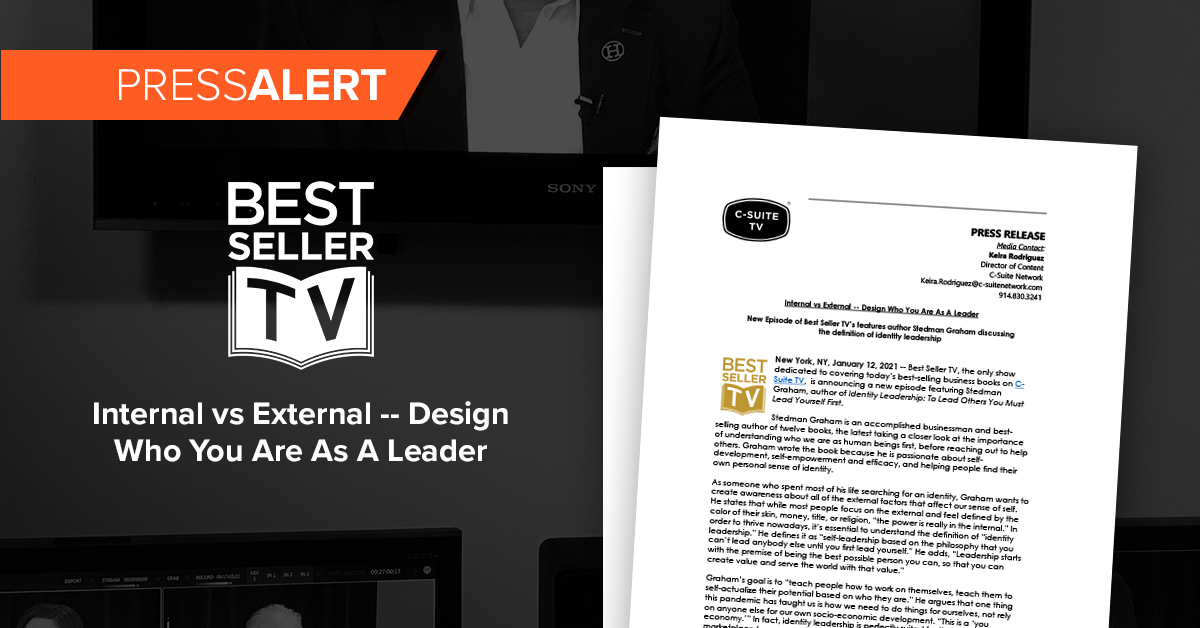
Best Seller TV, the only show dedicated to covering today’s best-selling business books on C-Suite TV, is announcing a new episode featuring Stedman Graham, author of Identity Leadership: To Lead Others You Must Lead Yourself First.
Stedman Graham is an accomplished businessman and best-selling author of twelve books, the latest taking a closer look at the importance of understanding who we are as human beings first, before reaching out to help others. Graham wrote the book because he is passionate about self-development, self-empowerment and efficacy, and helping people find their own personal sense of identity.
As someone who spent most of his life searching for an identity, Graham wants to create awareness about all of the external factors that affect our sense of self. He states that while most people focus on the external and feel defined by the color of their skin, money, title, or religion, “the power is really in the internal.” In order to thrive nowadays, it’s essential to understand the definition of “identity leadership.” He defines it as “self-leadership based on the philosophy that you can’t lead anybody else until you first lead yourself.” He adds, “Leadership starts with the premise of being the best possible person you can, so that you can create value and serve the world with that value.”
Graham’s goal is to “teach people how to work on themselves, teach them to self-actualize their potential based on who they are.” He argues that one thing this pandemic has taught us is how we need to do things for ourselves, not rely on anyone else for our own socio-economic development. “This is a ‘you economy.’” In fact, identity leadership is perfectly suited for the current marketplace because it teaches us to redefine our own existence.
He admits that defining yourself is an evolving process. Graham said, “It’s a process of consciousness. You have to be aware of what you don’t have.” It’s about evolving into better versions of ourselves.
Business is all about being able to be adaptable and creating new paradigms for new models and programs. People who are successful are not defined by external factors like class, status or gender – they just know who they are. Graham also provides a great example – as the partner of one of the most powerful women in the world, Oprah Winfrey, he feels comfortable enough in his own skin, seeking knowledge through constant education. He concludes with, “If you’re not clear on who you are, and where you’re going, and how are you going to get there, then you really don’t have a life. You’re just going through the motions.”
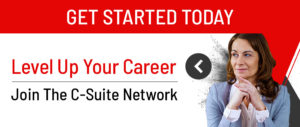
All episodes of Best Seller TV air on C-Suite TV and are hosted by TV personality, Taryn Winter Brill.
Best-selling author, speaker, and former Fortune 100 CMO Jeffrey Hayzlett created Best Seller TV to give top-tier business authors a forum for sharing thought-provoking insights, in-depth business analysis, and their compelling personal narratives.
“I’ve known Stedman for some time now and I’m always impressed by his poise, knowledge, and his generosity in sharing his wisdom with as many people as possible,” Hayzlett said. “A successful businessman in his own right, the knowledge he has amassed throughout his career is evident in his persona and the book as well. I hope that the audience learns to focus more on internal factors, rather than external, to design their own leadership style.”
For more information on TV episodes, visit www.csuiteold.c-suitenetwork.com/tv and for more information about the authors featured in Best Seller TV episodes, visit www.c-suitebookclub.com.
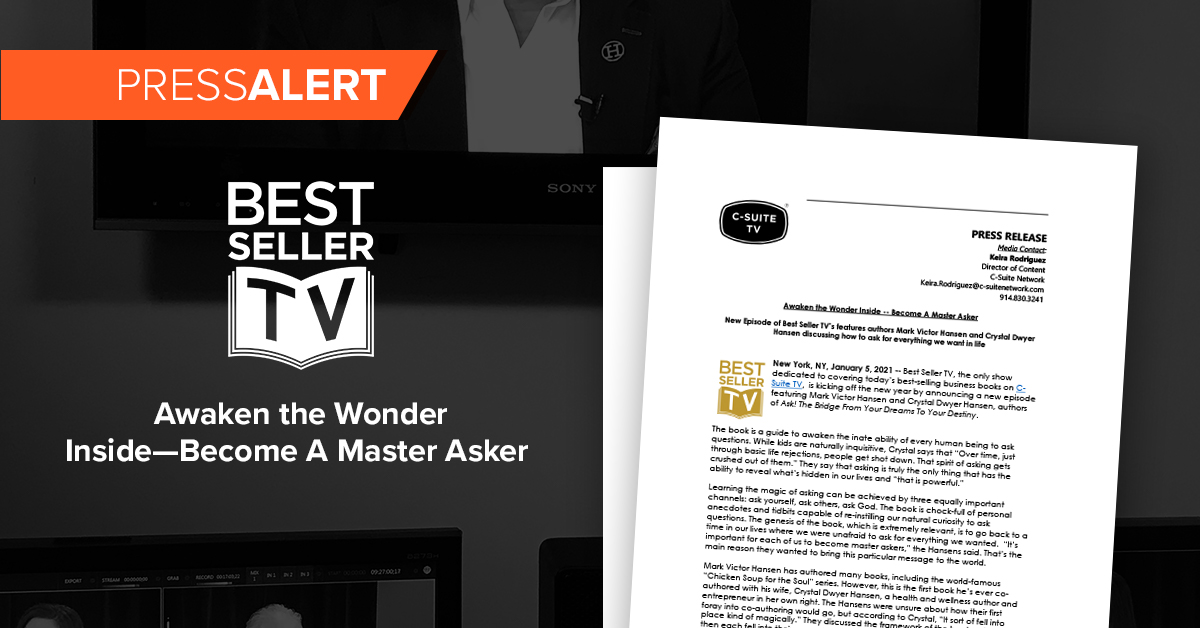
Best Seller TV, the only show dedicated to covering today’s best-selling business books on C-Suite TV, is kicking off the new year by announcing a new episode featuring Mark Victor Hansen and Crystal Dwyer Hansen, authors of Ask! The Bridge From Your Dreams To Your Destiny.
The book is a guide to awaken the inate ability of every human being to ask questions. While kids are naturally inquisitive, Crystal says that “Over time, just through basic life rejections, people get shot down. That spirit of asking gets crushed out of them.” They say that asking is truly the only thing that has the ability to reveal what’s hidden in our lives and “that is powerful.”
Learning the magic of asking can be achieved by three equally important channels: ask yourself, ask others, ask God. The book is chock-full of personal anecdotes and tidbits capable of re-instilling our natural curiosity to ask questions. The genesis of the book, which is extremely relevant, is to go back to a time in our lives where we were unafraid to ask for everything we wanted. “It’s important for each of us to become master askers,” the Hansens said. That’s the main reason they wanted to bring this particular message to the world.
Mark Victor Hansen has authored many books, including the world-famous “Chicken Soup for the Soul” series. However, this is the first book he’s ever co-authored with his wife, Crystal Dwyer Hansen, a health and wellness author and entrepreneur in her own right. The Hansens were unsure about how their first foray into co-authoring would go, but according to Crystal, “It sort of fell into place kind of magically.” They discussed the framework of the book collectively, then each fell into their respective lanes of expertise, making collaboration a seamless process.
While everyone faces adversity, Mark Victor offers some sage advice, originated in his own hardship, including bankruptcy. He added, “I’ve always taken adversity and turn it into an advantage.” Out of this adversity, everyone can learn how to ask.
During the interview, they also covered the six destinies everyone has, a personal anecdote about their young grandson that directly correlates to the book’s themes, and a reminder that “one question can pivot your entire career.”
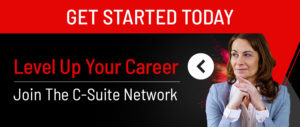
All episodes of Best Seller TV air on C-Suite TV and are hosted by TV personality, Taryn Winter Brill.
Best-selling author, speaker, and former Fortune 100 CMO Jeffrey Hayzlett created Best Seller TV to give top-tier business authors a forum for sharing thought-provoking insights, in-depth business analysis, and their compelling personal narratives.
“I’ve known Mark Victor for a number of years, and now his wife Crystal, and I can’t think of better people to kick off the new year with,” Hayzlett said. “They bring incredible insights as a result of their travels, speaking to people from all walks of life, and their life experiences. I’m positive our audience will find much needed inspiration in this interview, especially during these difficult times we’re experiencing.”
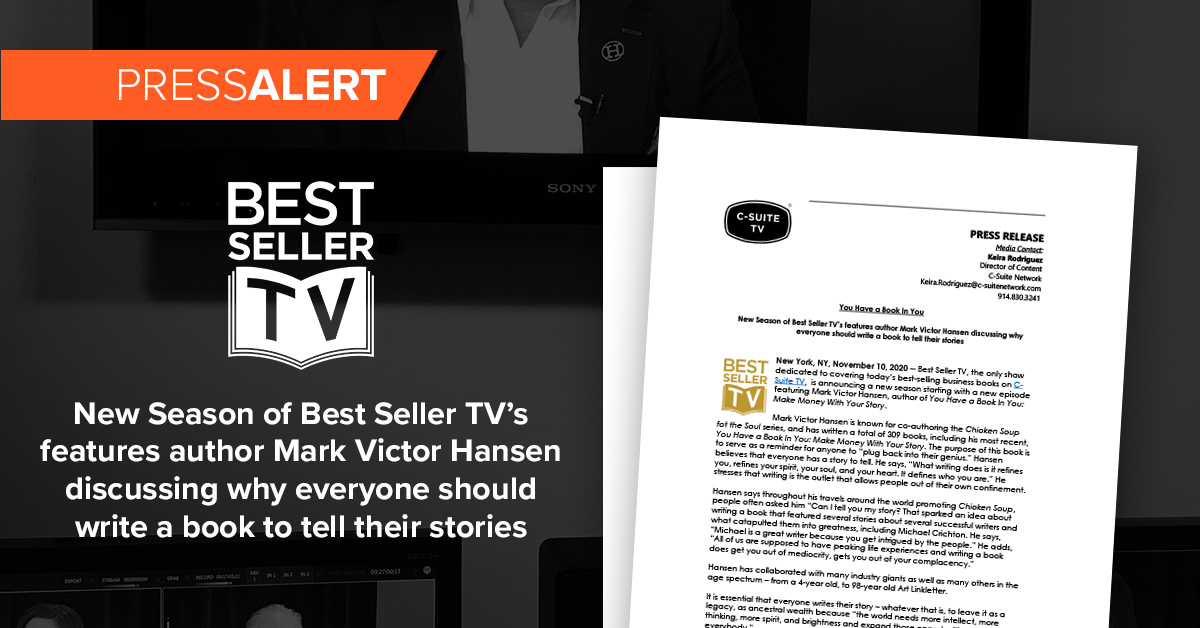
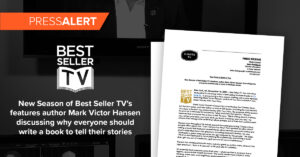
Best Seller TV, the only show dedicated to covering today’s best-selling business books on C-Suite TV, is announcing a new season starting with a new episode featuring Mark Victor Hansen, author of You Have a Book In You: Make Money With Your Story.
Mark Victor Hansen is known for co-authoring the Chicken Soup for the Soul series, and has written a total of 309 books, including his most recent, You Have a Book In You: Make Money With Your Story. The purpose of this book is to serve as a reminder for anyone to “plug back into their genius.” Hansen believes that everyone has a story to tell. He says, “What writing does is it refines you, refines your spirit, your soul, and your heart. It defines who you are.” He stresses that writing is the outlet that allows people out of their own confinement.
Hansen says throughout his travels around the world promoting Chicken Soup, people often asked him “Can I tell you my story? That sparked an idea about writing a book that featured several stories about several successful writers and what catapulted them into greatness, including Michael Crichton. He says, “Michael is a great writer because you get intrigued by the people.” He adds, “All of us are supposed to have peaking life experiences and writing a book does get you out of mediocrity, gets you out of your complacency.”
Hansen has collaborated with many industry giants as well as many others in the age spectrum – from a 4-year old, to 98-year old Art Linkletter.
It is essential that everyone writes their story – whatever that is, to leave it as a legacy, as ancestral wealth because “the world needs more intellect, more thinking, more spirit, and brightness and expand those opportunities for everybody.

All episodes of Best Seller TV air on C-Suite TV and are hosted by TV personality, Taryn Winter Brill.
Best-selling author, speaker, and former Fortune 100 CMO Jeffrey Hayzlett created Best Seller TV to give top-tier business authors a forum for sharing thought-provoking insights, in-depth business analysis, and their compelling personal narratives.
“Mark Victor and I go way back and he has an incredible ability to weave a story that’s compelling and memorable,” Hayzlett said. “He’s someone that has written 309 books and believes everyone should write a book. His credibility on the subject is unparalleled and we’re honored to have him on the show.”
For more information on TV episodes, visit www.csuiteold.c-suitenetwork.com/tv and for more information about the authors featured in Best Seller TV episodes, visit www.c-suitebookclub.com.